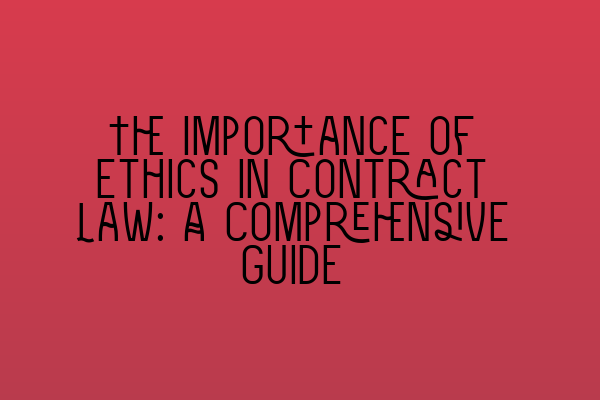The Importance of Ethics in Contract Law: A Comprehensive Guide
Welcome to SQE Contract Law, your trusted source for information on all things related to contract law. In this comprehensive guide, we will explore the importance of ethics in contract law and why it should be a priority for solicitors and legal professionals.
What are Ethics in Contract Law?
Ethics in contract law refer to the moral principles and standards that guide the behavior and actions of solicitors when entering into, interpreting, and enforcing contracts. It is the foundation of trust and fairness in business relationships and ensures that all parties involved are treated fairly and justly.
In contract law, ethics dictate the obligations and responsibilities that solicitors have towards their clients, the other party, and the legal system as a whole. These ethical considerations are legally binding and failure to adhere to them can have severe consequences.
Why are Ethics Important in Contract Law?
1. Upholding Professional Integrity
As solicitors, we have a duty to act with integrity and uphold the highest professional standards. Ethics in contract law help us maintain our reputation and credibility in the legal industry. By conducting ourselves ethically, we demonstrate our commitment to fairness and justice.
Furthermore, ethical behavior builds trust and confidence among clients, which is vital for successful client relationships and long-term success. Clients want to work with solicitors who they can rely on to act in their best interests and with honesty and integrity, even in challenging situations.
2. Ensuring Fairness for All Parties
In contract law, ethics play a crucial role in ensuring fairness for all parties involved. A solicitor must ensure that the terms and conditions of a contract are fair and reasonable for both their client and the other party. They must avoid any conflicts of interest that could compromise the fairness of the agreement.
By adhering to ethical principles, solicitors help prevent exploitation and imbalance of power in contractual relationships. They act as gatekeepers who ensure that all parties have equal opportunities, that the terms of the contract are clear and understandable, and that there is no misleading or deceptive conduct.
3. Maintaining Legal Compliance
Ethics in contract law go hand in hand with legal compliance. Solicitors have a responsibility to ensure that the contracts they draft and enforce comply with relevant laws and regulations. They must stay updated with any changes in legislation and follow ethical guidelines to avoid legal disputes and penalties.
A failure to adhere to ethical standards can result in legal consequences, such as professional misconduct charges, loss of license to practice, or even civil liability. By acting ethically, solicitors minimize the risks of legal complications and protect themselves and their clients.
Key Ethical Considerations in Contract Law
When practicing contract law, solicitors must consider several ethical principles to ensure the integrity of the legal process. Here are some key ethical considerations:
1. Confidentiality
Solicitors must uphold strict confidentiality when handling client information, including the terms of a contract. They must maintain client privilege and not disclose any confidential information without express authorization from the client, except where required by law.
2. Conflict of Interest
Solicitors must avoid conflicts of interest that could compromise their duty to act in their clients’ best interests. They must disclose any potential conflicts and, if necessary, withdraw from representing a client to maintain impartiality.
3. Honesty and Candor
Solicitors must be honest and transparent with their clients throughout the contract drafting, negotiation, and enforcement process. They should provide accurate information, express any limitations, and avoid misleading or deceptive conduct.
4. Competence
Solicitors must only take on cases and contracts that they have the skills and expertise to handle effectively. They should continuously develop their professional knowledge and seek assistance or refer clients to specialists when needed.
5. Zealous Advocacy
While solicitors have a duty to zealously advocate for their clients’ interests, they must do so within ethical boundaries. They should not engage in dishonest or unethical tactics to secure an advantage for their clients.
The Role of Mentorship in Nurturing Ethical Practitioners
At SQE Contract Law, we believe in the power of mentorship in shaping the next generation of ethical solicitors. Mentorship provides aspiring solicitors with guidance, support, and real-world insights to navigate complex ethical dilemmas.
Our related articles on Mentorship for Aspiring Solicitors: Nurturing Talent in the Legal Field and Mentorship for Aspiring Solicitors: Finding Guidance on Your Legal Journey delve deeper into the importance of mentorship and how it can help aspiring solicitors develop strong ethical foundations.
Conclusion
Ethics in contract law form the backbone of a fair and just legal system. By upholding ethical principles, solicitors ensure the integrity of contractual relationships, maintain professionalism, and comply with legal requirements. As solicitors, it is our duty to prioritize ethics and act as trusted advisors for our clients.
To learn more about various aspects of contract law and the legal profession, explore our related articles on alternative dispute resolution, contract drafting and negotiation skills, and the path to solicitor qualification: Exploring Alternative Dispute Resolution: An Effective Approach to Legal Conflicts, The Art of Contract Drafting and Negotiation: Skills Every Solicitor Should Master, and Navigating the Legal Practice Course (LPC): Your Path to Solicitor Qualification.
